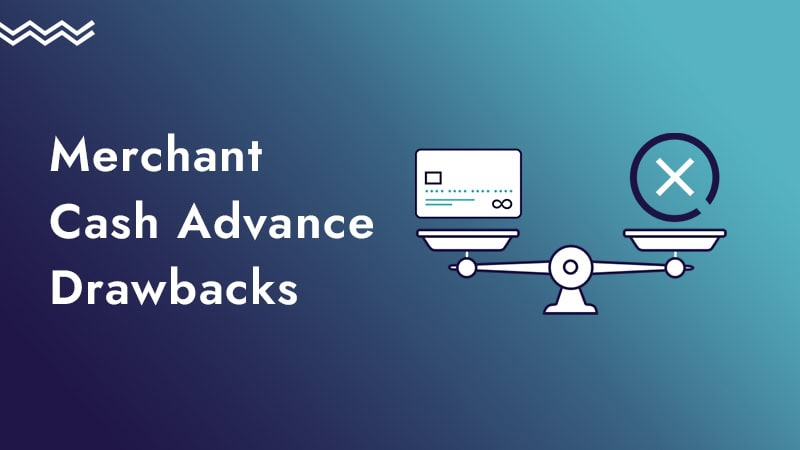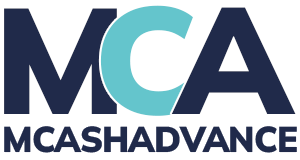
A merchant cash advance (MCA) gives you fast access to capital when other funding isn’t available. But it comes with tradeoffs. Some business owners don’t fully understand the risks until after they’ve accepted the offer.
We want to highlight the parts of this funding that can put pressure on your business. Below are the most common drawbacks we’ve seen business owners run into.
What Are the Drawbacks of an MCA?
Here’s a breakdown of the 13 potential drawbacks you should understand before accepting an MCA:
| Drawback | Description |
|---|---|
| 01. More Expensive than Traditional Loans | MCAs often cost more than loans. You repay a fixed fee that’s higher than typical loan interest. |
| 02. Daily Repayments May Impact Cash Flow | A percentage of your revenue is deducted daily, which can limit how you manage cash for rent, payroll, or inventory. |
| 03. No Savings on Early Repayment | Even if you repay early, the total repayment doesn’t change. There’s no interest to reduce. |
| 04. Confusing Fee Structure | Factor rates are different from APR and can make the true cost harder to compare with other funding options. |
| 05. Confession of Judgment Clauses | Some contracts include a clause that allows a court judgment without a hearing if you default. |
| 06. UCC Lien Filed on Your Business | We may file a UCC lien, which alerts other lenders and can limit your ability to get new financing. |
| 07. Personal Guarantee Requirements | You may be personally liable for repayment if your business can’t cover the advance. |
| 08. Higher Rates for High-Risk Businesses | If your business has unstable revenue or poor credit, your rate may be higher to reflect the added risk. |
| 09. Risk of Taking Multiple MCAs (Stacking) | Using more than one MCA at a time can lead to daily deductions that exceed your available cash flow. |
| 10. Short Repayment Terms Compress Operations | Most MCAs must be repaid in 3 to 18 months. That creates higher daily payments that can limit your ability to reinvest. |
| 11. Not Suited for Seasonal Businesses | If your sales slow down in certain months, fixed daily payments may become harder to cover. |
| 12. Won’t Help Improve Credit Score | Repayments aren’t reported to credit bureaus, so they won’t help your business credit. |
| 13. Lack of Regulation and Transparency | MCA agreements aren’t regulated like loans. Providers aren’t required to disclose APR or follow standard lending laws. |
1. More Expensive than Traditional Loans
MCAs usually cost more than a traditional loan. Instead of interest, we charge a fixed fee using what’s called a factor rate. If you borrow $10,000 at a 1.25 factor rate, you’ll repay $12,500—$2,500 more than you borrowed. The higher your risk, the higher the rate.
2. Daily Repayments May Impact Cash Flow
Repayments come from your daily card sales or revenue deposits. On high-sales days, you pay more. On slow days, you pay less. This can create tension with expenses like rent, payroll, or vendor payments.
3. No Savings on Early Repayment
MCAs don’t work like loans with interest. If you repay early, the fee stays the same. Paying off in one month costs the same as paying over six. There’s no discount for early payoff.
4. Confusing Fee Structure
Factor rates aren’t always intuitive. A 1.4 rate means you pay back 40% more than you borrowed. It’s not the same as an APR, and that makes it harder to compare against other financing options.
5. Confession of Judgment (COJ) Clauses
Some MCA contracts include a clause called a confession of judgment. If you default, it lets the provider enter a court judgment without a hearing. That can lead to frozen bank accounts or fast legal action.
6. UCC Lien Filed on Business Assets
We may file a UCC lien against your business. This gives us the right to claim certain assets if you default. Other lenders will see this lien, and that may stop you from getting new financing until the advance is repaid.
7. Personal Guarantee Requirements
Some MCA agreements require a personal guarantee. That means if your business can’t repay the advance, you’re personally on the hook. We can pursue your personal bank account or other assets.
8. Higher Rates for High-Risk Businesses
If your business has poor credit, unstable sales, or works in a high-risk industry, your rate will likely be higher. This is how we manage risk on short-term funding with no collateral.
9. Risk of Taking Multiple MCAs (Stacking)
Some business owners take a second or third MCA to pay off the first. This is called stacking. It creates a repayment load that grows fast and can overwhelm your cash flow.
10. Short Repayment Terms Compress Operations
Most MCAs are repaid in 3 to 18 months. That short timeline means higher daily deductions. If your business doesn’t maintain strong revenue, it can limit your ability to restock or hire.
11. Not Suited for Seasonal Businesses
If your revenue changes month to month, a fixed daily repayment can hurt. Seasonal slowdowns won’t pause your deductions. That can lead to a cash crunch during quiet periods.
12. Won’t Help Improve Credit Score
We don’t report MCA repayment to credit bureaus. Even if you repay on time, it won’t improve your credit. This can limit your ability to qualify for traditional loans in the future.
13. Lack of Regulation and Transparency
MCAs aren’t governed by the same laws as loans. There’s no rule requiring us to disclose APR. Terms vary between providers, and that makes it harder to compare offers side by side.
We only want to fund businesses that understand both the benefits and the drawbacks. This type of funding isn’t suitable for every business. If you’re unsure whether it makes sense for yours, talk to an accountant or someone who understands your cash flow patterns. Make sure you can repay the advance comfortably. We’re happy to walk you through the terms before you apply. Whether you move forward with us or not, it’s worth making sure this funding helps your business, not adds more strain.
Ready to Apply?
or learn more about MCA Advance

